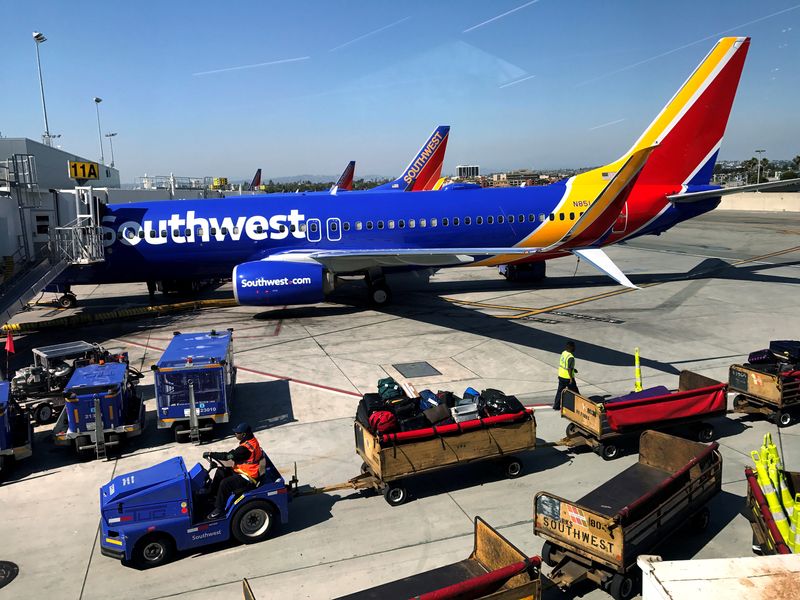By Rajesh Kumar Singh and Shivansh Tiwary
CHICAGO (Reuters) - Shares of Southwest Airlines (NYSE:LUV) slumped on Thursday as its outlook for the current quarter and full year disappointed investors, fueling concerns about the strength of domestic travel demand.
The largest U.S. domestic carrier also missed Wall Street earnings estimates for the second quarter.
Its shares were down about 10% in afternoon trade, dragging down the broader NYSE Arca Airline index.
Investors have been worried about a slowdown in domestic travel after recent fare data shows ticket prices for domestic flights have peaked. Airlines have been relying on strong demand to offset higher costs.
The Dallas-based company's revenue per available seat mile (RASM) - a proxy for pricing power, is projected to decline as much as 7% in the September quarter from a year ago. Meanwhile, it expects a jump in labor expense to drive up its non-fuel operating costs this year.
Southwest attributed the decline in RASM to a tough year-on-year comparison as resumption of travel after the pandemic amid limited flights had sent airfares soaring last year.
Earlier this week, domestic leisure carrier Alaska Air (NYSE:ALK) Group had also warned of a decline in pricing power in the current quarter from a year ago, saying surging international travel demand had also led to a drop in domestic travel.
"We expect shares of Southwest (as well as the other domestically focused carriers) to continue to trade down near term as its results will amplify concerns around slowing domestic air travel demand," TD Cowen analysts said in a note.
Southwest executives, however, said leisure travel demand remains resilient and is expected to generate "record" revenue for the company in the September quarter.
On an earnings call, Chief Commercial Officer Ryan Green said Southwest had an "all-time record" fare sale last month for travel this autumn.
The company, however, is wrestling with ever-changing travel patterns. As a result, it now plans to shift frequency of its flights from mostly short-haul business travel heavy routes to more medium and long-haul routes.
Southwest did not provide a profit estimate for the third quarter, but Raymond James' Savanthi Syth said its outlook implied earnings in the range of 31 cents-76 cents a share. That is lower than analysts' consensus earnings estimate of 96 cents per share for the quarter, according to a Refinitiv survey.

Daniel McKenzie, an analyst at Seaport Research Partners, called Southwest's earnings report "the worst" in the company's history.
Southwest's adjusted profit for the second quarter came in at $1.09 per share, below analysts' estimates of $1.10 per share, according to Refinitiv data.